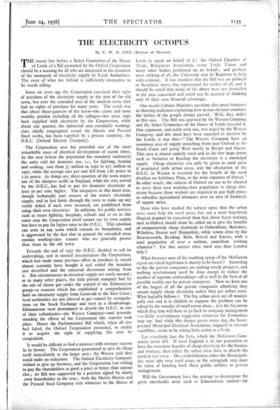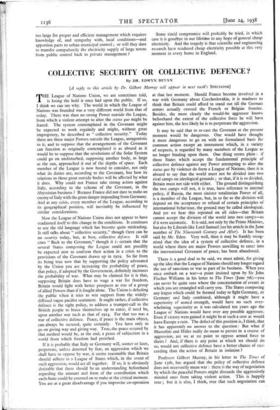THE ELECTRICITY OCTOPUS
By E. W. B. GILL (Bursar of Merton)
THE recent fate before a Select Committee of the House of Lords of a Bill promoted by the Oxford Corporation should be a warning for all who are interested in the retention of the monopoly of electricity supply by Local Authorities. The story of what lies behind is sufficiently instructive to be worth telling.
Some six years ago the Corporation exercised their right of purchase of the electricity supply in the area of the old town, but over the extended area of the modern town they had no rights of purchase for many years. The result was that about three-quarters of the town—the centre and most wealthy portion including all the colleges—has since 1932 been supplied with electricity by the Corporation, while about one quarter, the industrial area essentially working- class chiefly congregated round the Morris and Pressed Steel works, has been supplied by a private company, the O.E.C. (Oxford Electric Company).
The Corporation area has provided one of the most remarkable cases of electrical development of recent times. In this area (where the population has remained stationary) the units sold for domestic use, i.e., for lighting, heating and cooking, rose from 31 million in 1932 to 251 million in 1937, while the average cost per unit fell from 5.67 pence to 1.22 pence. As things are, three-quarters of the town enjoys one of the cheapest tariffs in England, while the rest, served by the O.E.C., has had to pay for domestic electricity at least 5o per cent. higher. The ratepayers in this latter area, though technically part owners of the town's electricity supply, and in fact liable through the rates to make up any yearly deficit if such were incurred, are prohibited from using their own electricity. In addition, for public services such as street lighting, hospitals, schools and so on in this outer area the Corporation itself cannot use its own supply but have to pay far higher rates to the O.E.C. This situation can arise in any town which extends its boundaries, and is aggravated by the fact that in general the extended areas contain working-class tenants who are generally poorer than those in the old town.
Towards the end of 1937 the O.E.C. decided to sell its undertaking, and in normal circumstances the Corporation, which had made many previous offers to purchase it, would almost certainly have bought it and ended the injustice just described and the universal discontent arising from it. But circumstances in electrical supply are rarely normal ; as in many other places, the little private company had by the sale of shares got under the control of the Edmondson group—a concern which has established a comprehensive hold on electricity supply from Cornwall to the East Coast ; local authorities are not allowed to get control by manipula- tions on the Stock Exchange and start at a disadvantage. Edmundsons were determined to absorb the O.E.C. in one of their subsidiaries—the Wessex Company—and notwith- standing the efforts of the Corporation this transfer took place. Hence the Parliamentary Bill which, when all else had failed, the Oxford Corporation promoted, to enable it to acquire the right of supplying this area by compulsion.
It would be difficult to find a measure with stronger reasons in its favour. The Corporation guaranteed to give its cheap tariff immediately to the larger area ; the Wessex said they could make no reduction. The Oxford Electricity Company wished to give up business, and the Corporation was willing to pay, the shareholders as good a price or better than anyone else ; its Bill was supported by a petition signed by nearly ;very householder in the area ; both the Morris Motors and the Pressed Steel Company sent witnesses to the House of Lords to speak on behalf of it ; the Oxford Chamber of Trade, Ratepayers Association, every Trade Union and many other bodies petitioned on its behalf ; and perhaps most striking of all, the University sent its Registrar to help with evidence. It was manifest that the Bill was no political or Socialistic move, but represented the wishes of all, and it should be noted that many of the above were not domiciled in the area concerned and could not be accused of thinking only of their own financial advantage.
One recalls Cabinet Ministers speaking after great banquets to cheering audiences explaining how in non-dictator countries the wishes of the people always prevail. Well, they didn't in this case. The Bill was opposed by the Wessex Company and the Select Committee of the House of Lords rejected it. One argument, and really only one, was urged by the Wessex Company, and this must have been regarded as decisive by the Lords, it was this—" The Wessex Company have an enormous area of supply stretching from near Oxford to the South Coast and going West nearly to Bristol and Exeter. This area is almost entirely rural and in the few large towns such as Swindon or Reading the electricity is a municipal supply. Cheap electricity can only be given to rural areas if associated with urban areas, and the absorption of the O.E.C. in Wessex is essential for the benefit of the rural dwellers on Salisbury Plain, or the wide expanses of Dorset." In other words, the citizens of Oxford are not to be allowed to assist their own working-class population to cheap elec- tricity because those workers are required to pay high prices to subsidise agricultural labourers over an area of hundreds of square miles.
Most who have studied the subject agree that the urban areas must help the rural areas, but can a more hopelessly illogical demand be conceived than that about 8,000 working men in Oxford should alone be called on to give the benefits of comparatively cheap electricity to Oxfordshire, Berkshire, Wiltshire, Dorset and Hampshire, while towns close by like Bournemouth, Reading, Bath, Bristol and Exeter, with a total population of over a million, contribute nothing whatever ? For that matter what rural area does London help ?
What becomes now of the soothing syrup of the McGowan report on which legislation is shortly to be based ? According to this the private companies are making steady progress, and nothing revolutionary need be done except to reduce the number of separate undertakings—all is well in the best of all possible worlds run by private enterprise. Now we have one of the largest of all the private companies admitting they cannot supply cheap electricity unless they get urban areas. What logically follows ? The big urban areas are all munici- pally run and it is childish to suppose the problem can be solved by the transfer of small towns alone ; it is the big towns which they hint will have to go back to company management —a fairly revo!utionary suggestion whatever the Committee may say. And while this danger grows every day, the Incor- porated Municipal Electrical Association, engaged in internal squabbles, seems to be taking little action as a body.
Let everybody face the facts, which the McGowan Com- mittee never did. If rural England is in our generation to have the enormous benefits of cheap electricity for the farmers and workers, then either the urban areas have to absorb the rural or vice versa. On a redistribution either the Municipali- ties must take over rural areas, or the retrograde step must be taken of handing back these public utilities to private management.
Will the Government have the courage to disintegrate the great ramshackle areas such as Edmundsons control—far too large for proper and efficient management which requires knowledge of, and sympathy with, local conditions—and apportion parts to urban municipal control ; or will they dare to transfer compulsorily the electricity supply of large towns from public control back to private management ? Some timid compromise will probably be tried, in which case it is goodbye in our lifetime to any hope of general cheap electricity. And the tragedy-is that scientific and engineering research have rendered cheap electricity possible at this very moment in every home in England.















































 Previous page
Previous page